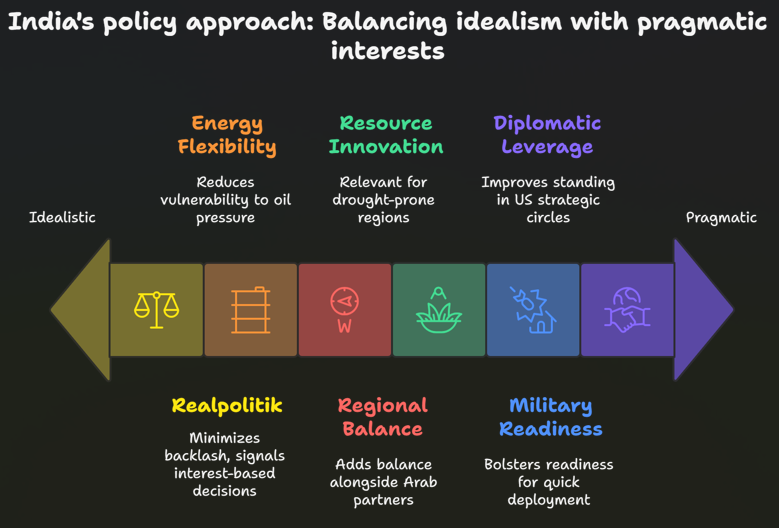Font size:
Print
India’s Foreign Policy Dilemma: An Avoidable Risk in Israel-Palestine Ties
India’s Foreign Policy Choices in West Asia: A Costly Balancing Act
Context: Recently, India abstained from UN ceasefire resolution in the context of the Israel-Hamas conflict.
What is the core issue with India’s current foreign policy stance on the Israel-Palestine conflict?
- India’s foreign policy has evolved from a historically principled and pro-Palestinian approach rooted in anti-colonial solidarity to a more strategically balanced engagement that includes closer ties with Israel.
- This shift reflects India’s efforts to pursue its national interests in defence, technology, and geopolitics, especially in the context of changing dynamics in West Asia where several Arab countries have also normalised relations with Israel.
What are the legal and humanitarian implications of India’s recent abstentions?
India’s abstentions from ceasefire resolutions:
- Undermine international humanitarian law.
- Contradict India’s support for multilateralism and rules-based order.
- Risk portraying India as indifferent to war crimes, civilian deaths, and humanitarian crises.
When did India’s position begin to shift, and what are recent indicators of this trend?
India’s policy shift began to crystallise in the last decade, especially with increasing defence, tech, and intelligence cooperation with Israel post-2014.
- Recent indicators: On June 12, 2025, India abstained from a UN resolution titled “Protection of Civilians and Upholding Legal and Humanitarian Obligations” in the context of the ongoing Israel-Hamas conflict.
- Earlier abstentions and muted responses during key escalations (e.g., 2021 Gaza conflict) have raised similar concerns.

Where does this diplomatic shift impact India’s global and regional position?
- Regionally, it strains ties with Iran, Arab countries, and parts of the Muslim world, affecting strategic projects like Chabahar Port and International North-South Transport Corridor (INSTC).
- Globally, India risks eroding its soft power and moral capital in the Global South, where solidarity with Palestine remains a litmus test of ethical foreign policy.
- Domestically, the moral and humanitarian concerns resonate with civil society, undermining the image of India as a bastion of “Vasudhaiva Kutumbakam.”
What is the disadvantage in this foreign policy?
- Strategically, closer ties with Israel have not yielded significant breakthroughs in defence independence, innovation, or diplomatic support.
- Morally, India’s abandonment of the Palestinian cause undermines its historical identity and reputation as a voice for justice and self-determination.
- Additionally, India’s abstention on resolutions critical of Israeli aggression makes it appear complicit in violations of international law, further tarnishing its global image.

How does India’s past position contrast with its current approach?
-
Historical Position:
- Strong support for Palestinian self-determination.
- Early recognition of the State of Palestine in 1988.
- Leaders like Mahatma Gandhi and Jawaharlal Nehru voiced opposition to Zionism and the forceful occupation of Palestinian lands.
- India consistently voted in favour of Palestinian resolutions at the UN.
-
Current Approach:
- Increasingly abstaining from key UN resolutions condemning Israel.
- Greater focus on defence ties, surveillance technology, and counter-terrorism cooperation with Israel.
- Silence or neutral language during humanitarian crises in Gaza.
How does this policy shift affect India’s soft power and moral capital?
- India’s historical moral authority—built on the Gandhian legacy of non-violence and support for the oppressed—is being compromised. This weakens:
- Its soft power among developing nations.Its ability to influence global debates on justice and equity.
- Its position as a potential leader of the Global South.
What are the risks to India-Iran relations from this realignment?
- Iran sees Palestine as central to its foreign policy and ideological identity.
- India’s growing alignment with Israel may alienate Iran, affecting:
- Energy security (India imports significant oil from Iran when sanctions permit).
- Chabahar Port and regional trade routes bypassing Pakistan.
- Counterbalance to Pakistan-Afghanistan-China axis in Central Asia.


